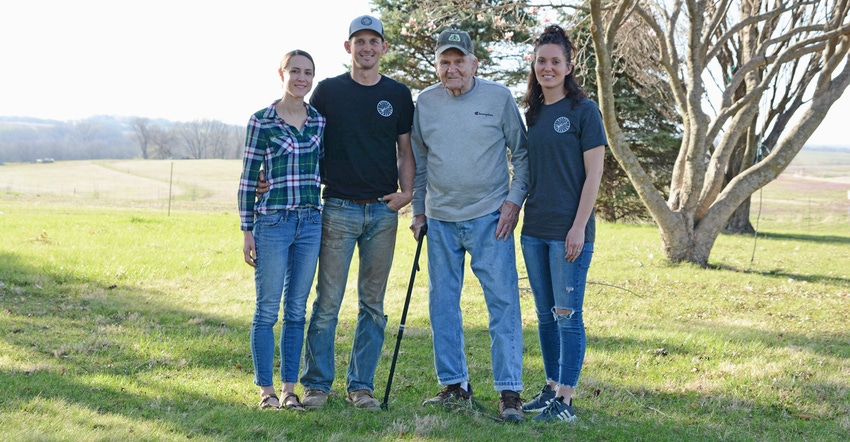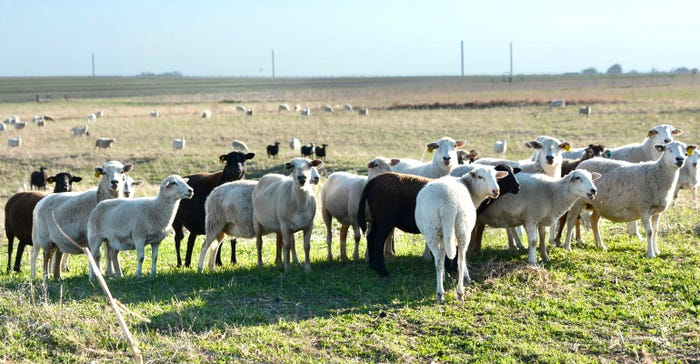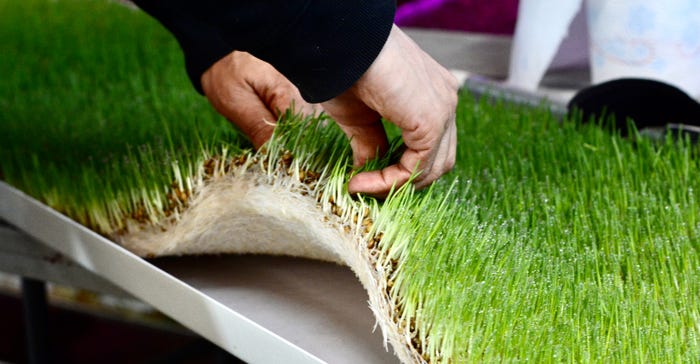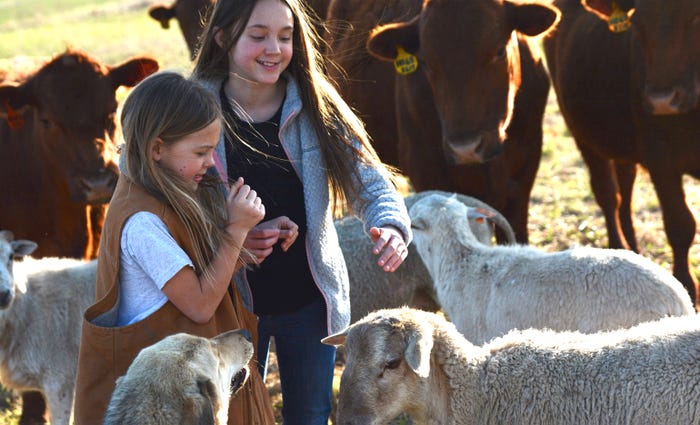June 7, 2022

Nestled back off a gravel road, with the buzzing sound of Interstate 70 drifting the farther you drive, is the Payne family homestead.
With the beautiful scenery and farm ground for miles, Charlie Payne undoubtedly made a valuable decision when he moved to Concordia, Mo., in 1955. Purchasing the acreage the family farm sits on in 1965, he was able to diversify the operation to include row crops, a confinement hog operation and a herd of cattle.
Jump forward to today, and the Payne family operation has grown in people and variety. Josh Payne is the grandson of 93-year-old Charlie, and over the past 10 years, they have transitioned from a conventionally tilled row crop operation into an operation with a living root in the ground between all crops. In addition, they graze a 350-head flock of ewes on a continual forage chain by growing their own fodder at the farm using a tray system.
Making the decision to transition from a conventionally tilled operation to no-till and implementing cover crops did not come easy.
Open discussion around change
After attending the Agroforestry Academy, networking with peers at the University of Missouri and extensive research, Josh finally felt like he found a solid plan to present to the family and, more importantly, Grandpa Charlie.
Typically, after presenting an idea, Josh remembers his grandpa’s response more often than not being, “That’s not gonna work.” So, Josh would go back to the drawing board, research some more and try a different approach. After all the pushing and pulling from both sides, Charlie finally gave a reply of, “Well, that could work.”

ADDED ENTERPRISE: Sheep graze on open acres at the Payne farm in Concordia, Mo. The family brought in the ewes as a way to harvest forage on the farm. With the uptick in the lamb market, it is proving to be a profitable venture for the family.
Josh recalls a big part of their early decision making when getting into cover crops was, “Grandpa taking his real-world experience and him saying, ‘Well, I’ve seen this, and it’s not going to work,’ and him being honest about that, but also me being diligent enough and persistent enough.”
Even if all of Josh’s ideas aren’t Charlie’s most favorite (including the 30 acres of chestnut trees), they like to mirror their operation to that of an enterprise model.
When Josh’s sister, Jordan, decided to leave her teaching position and come to the farm full time, she wanted to incorporate beekeeping into their operation. The initial discussion included topics such as how it would fit in with the rest of the system, or if there was place to do it on the farm. If that made sense, then they ask whether there is money in it, and whether the family has time for it.
Shift in farm roles
For a long time, Charlie had the final decision, which is typical in most farming operations — one person making the decisions. As Josh grew and learned more about the farming operation, and what he wanted to do, Charlie would entertain more of his ideas and would take his input into consideration.
Now, at 93 years old, Charlie has moved into more of an advisory role on the farm. Josh enjoys visiting and talking every day with his grandfather, and still running ideas and decisions back and forth across the kitchen table. Having Charlie’s purpose and meaning shift from a physical role to a mentor and champion for the Payne family, Josh attests, is just as important and valuable.

FODDER FEAST: Trays of barley fodder, which will be used to feed livestock, are on full display and tended to every day. It is a tray system that allows for feed production year-round.
Incorporating their children into their operation is as equally significant in decisions. Whether it be adding their own enterprise to the family’s direct-market business, herding sheep, doing daily chores or assisting with routine care for the livestock, the next generation can see firsthand that their work is meaningful on the farm.
Future-focused decisions
Reflecting back on the journey their family took to get to where they are now, Josh is confident — just like his grandfather was 50 years ago — they are making the right decision for them at this moment. Making decisions and working as a family, they work toward creating a place their kids and future grandkids can be a part of.
Beaming with pride, Josh says, “We tell them you belong here. With the land and to the land. I hope as we do it, we do it in a way our kids feel like they belong here.”

NEXT GENERATION: Reina and Ella, daughters of Josh and Larin Payne, take pride in showcasing their flock of Katahdin sheep. In the background, the family’s cattle look on. The Paynes operate a companion grazing program on the farm.
The family direct-markets under the name Rusted Plowshare. They provide gourmet, grass-fed beef and lamb, as well as harvested chestnuts from their farm that are all available for purchase at the Brookside Farmers Market in Kansas City.
Find more about their operation at their website, rustedplowshare.com, as well as on their Facebook and Instagram pages.
Loges writes from Higginsville, Mo.
Read more about:
Next GenerationYou May Also Like




